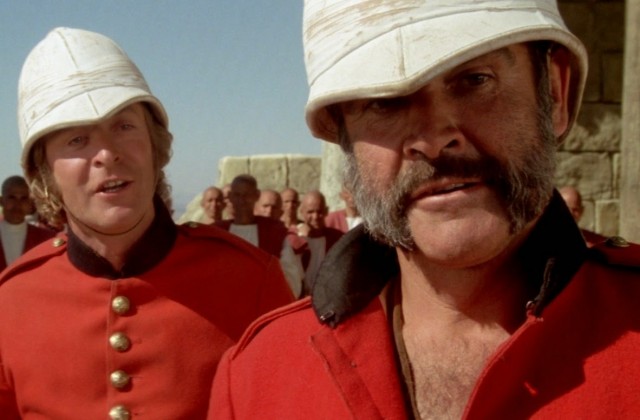John Huston’s The Man Who Would Be King is terrific spectacle

Itching for a film ripe with adventure, comedy, delusions of grandeur? Lucky you. It just so happens I’ve got just such a treat for this week’s Throwback Thursday edition.
“With great power comes great responsibility”
– Voltaire
“Power tends to corrupt and absolute power corrupts absolutely.”
– John Emerich Edward Dalberg-Acton
Think about those two quotations for a minute: How many times have you seen the themes borne out in one form or another? In how many films? And books? And plays? You can apply them to any number of television programs past and present, regardless of the year. (For me? One of the first things that comes to mind when I see those quotes is Warner Bros. cartoons, especially ones featuring Bugs Bunny. Not Bugs as protagonist falling prey to the themes but his many nemeses.)
Hell … for that matter, how many times have you seen or read about them played out in real life? Because they’re everywhere, through the likes of moguls and political figures and various others who keep the news and the tabloids hopping month to month.
Time and again, we’ve witnessed both quotations laid out and here they are once more in The Man Who Would Be King. And in this incarnation they’re put forth grandly and very well indeed.
Adapted from the short story by Rudyard Kipling, two ex-officers of the Indian Army (Michael Caine as Peachy Carnehan and Sean Connery as Daniel Dravot) make a pact to seek their fortunes in far away Kafiristan (an area of Afghanistan) during 19th-century British India. Their intentions are to conquer local tribes with the ultimate goal of becoming kings of all the lands through good old fashioned English know how. After all, two British smugglers and con men can surely outwit the primitive savages of Afghanistan, right?
Fast forward: They do.
Their long, treacherous trek through snow-capped peaks of India and into the desolate wastes of Afghanistan bear fruit quickly. They are able to first convince one lowly tribe of villagers, complete with a rather cowardly leader Ootah, that they have the ability (with the help of firearms) to waylay their enemies in overpowering fashion. One victory leads to another, not only uniting tribe after tribe but eventually becoming an all-encompassing amalgam no force in the land is able to contend with. During one particular battle, Daniel is seemingly pierced by an arrow to the chest, but it simply wedges into his bandolier. Pulling it out, it appears to the warring tribe he is a god among men — after all, he does not bleed through his “wound.” Word gets passed around of this “miracle” not only to the tribes and villages throughout Kafiristan but to the land’s priests of the holy city of Sikandergul who wish to see this miracle re-enacted for themselves. Before Daniel can be mortally wounded, the head priest is shocked by the symbol of “Sikander” (Alexander The Great) Daniel wears on his chest. Thousands of years past, Sikander once promised of his return to Kafiristan. That return has come in the form of Daniel who the locals take as the son of Sikander and, forthwith, godhood is bestowed upon him … along with all the spoils that go with the title. The two Englishmen are gobsmacked … or, in Daniel’s case, “god-smacked” as it were.
Boom. Just like that, Dravot and Carnehan find themselves the kings they set out to be.
But as it turns out, the power Daniel begins wielding over the people goes to his head. His rule is stately and just in the beginning — he hands out advise and decrees fair proclamations for all but his powers soon delude him and he decides to marry. The locals hold superstitious fears about such unions. Mere mortals cannot marry gods. If one does, the unlucky bride will die from the almighty’s very puissance. But Daniel takes no heed of this … and this is where the seduction of power comes full force into play.
Of course, The Man Who Would Be King is a cautionary tale warning of treading where man shouldn’t tread. It mixes man’s delusions and clouded judgments as he gets a taste of power and grandeur. Few who drink from the cup are immune to its lure.
There’s another part to Acton’s quote: “Great men are almost always bad men.” Daniel is neither great nor bad. He is simply capitalizing on his opportunity and is thus seduced by the appeal of his potential, twisting it to meet his own needs. His needs aren’t heinous or atrocious by any stretch of the imagination. But that’s what power does. It leads to corruption. And in this case, it leads Daniel to a fork in the road he simply shouldn’t take. I won’t spoil it for those who have not seen The Man Who Would Be King but I’m sure you get the gist of where the tale goes.
And, while it poses the question how much power is too much, the film is nevertheless a journey of terrific spectacle, grand adventure and well-placed comedy. It’s an outstanding mid-70s popcorn movie to be sure, superbly directed by the great John Huston … but one with rhyme and reason, one that doesn’t leave you empty and unfulfilled as many such popcorn flicks are wont to do. Caine, Connery and Christopher Plummer as Rudyard Kipling all fit well in their roles. Tribal leader Ootah and interpreter Billy Fish are two of my favorite characters in the film. And the unconfirmed-100-year-old-plus-at-the-time-of-filming Karroom Ben Bouih (who plays the holy Kafu Selim) adds a dire, weighty gravity to the high priest of Sikandergul. Even Michael Caine’s wife, Sharkira Caine, is featured in the film as the forbidden beauty Roxanne. Even the film’s score and signature tune (“The Minstrel Boy” with the lyrics of “The Son of God Goes Forth to War”) will leave you humming.
You can’t tell I really like the film, can you? Because when you throw everything into the mix — story, acting, adventure, comedy, cautionary tale, moral — and it comes out as well as this picture did, it’s difficult not to like it.
 CliqueClack
CliqueClack


